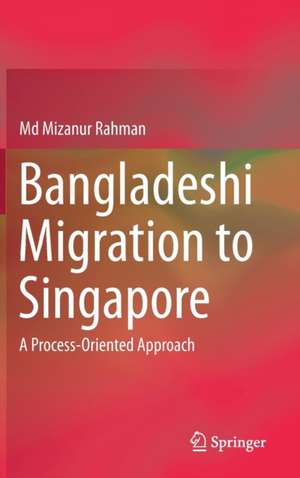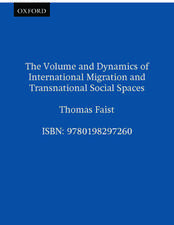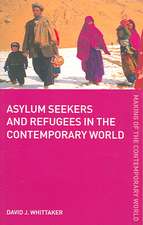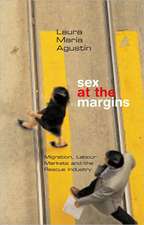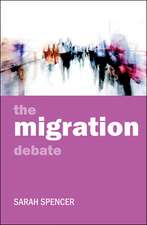Bangladeshi Migration to Singapore: A Process-Oriented Approach
Autor Md Mizanur Rahmanen Limba Engleză Hardback – 17 mar 2017
| Toate formatele și edițiile | Preț | Express |
|---|---|---|
| Paperback (1) | 580.17 lei 6-8 săpt. | |
| Springer Nature Singapore – 29 iul 2018 | 580.17 lei 6-8 săpt. | |
| Hardback (1) | 586.38 lei 6-8 săpt. | |
| Springer Nature Singapore – 17 mar 2017 | 586.38 lei 6-8 săpt. |
Preț: 586.38 lei
Preț vechi: 689.86 lei
-15% Nou
Puncte Express: 880
Preț estimativ în valută:
112.21€ • 117.39$ • 93.21£
112.21€ • 117.39$ • 93.21£
Carte tipărită la comandă
Livrare economică 03-17 aprilie
Preluare comenzi: 021 569.72.76
Specificații
ISBN-13: 9789811038563
ISBN-10: 9811038562
Pagini: 190
Ilustrații: XX, 198 p. 22 illus.
Dimensiuni: 155 x 235 x 14 mm
Greutate: 0.49 kg
Ediția:1st ed. 2017
Editura: Springer Nature Singapore
Colecția Springer
Locul publicării:Singapore, Singapore
ISBN-10: 9811038562
Pagini: 190
Ilustrații: XX, 198 p. 22 illus.
Dimensiuni: 155 x 235 x 14 mm
Greutate: 0.49 kg
Ediția:1st ed. 2017
Editura: Springer Nature Singapore
Colecția Springer
Locul publicării:Singapore, Singapore
Cuprins
List of Figures.- List of Tables.- Preface.- Acknowledgements.- Chapter 1: Introduction.- Chapter 2: Labour, Migration and Policy Framework.- Chapter 3: Social Underpinning of Migration Decision-Making.- Chapter 4: Recruitment of Migrant Labor: Demand for and Supply of Migrant Labour.- Chapter 5: Social and Economic Life of Migrants.- Chapter 6: The Remittance Process: Sending, Receipt and Control.- Chapter 7: Emigration and Empowerment.- Chapter 8: Conclusion.- Index.
Recenzii
“This well-written book combines empirical research and existing literature on migration, thus enhancing our understanding of international labour migration in the context of Singapore. … his book is an important source of knowledge for social scientists, policymakers and researchers, with the potential to become an important text for various courses related to migration and development studies.” (Diotima Chattoraj, SOJOURN - Journal of Social Issues in Southeast Asia, Vol. 34 (2), July 2019)
“His book is an important source of knowledge for academics, policymakers and researchers. Social science scholars will find this study particularly useful and it should become an important text for various courses covering issues related to migration studies, development, globalisation, population dynamics and Asian labour markets. This work, significantly, also identifies crucial policy implications for both destination and origin countries.” (A.K.M. Ahsan Ullah, South Asia Research, Vol. 38 (03), November, 2018)
Notă biografică
Md Mizanur Rahman is Associate Professor of Sociology at the Institute of Asian Studies, Universiti Brunei Darussalam, Brunei Darussalam. His areas of expertise include migration and development, diaspora engagement, migrant businesses, labor migration, migration policy and migrant remittances. He has conducted extensive fieldwork for his migration related research projects in a number of countries such as Singapore, Malaysia, Japan, South Korea, Bangladesh, Hong Kong SAR, Qatar, the UAE, India, Indonesia, Germany, Italy, the UK, Canada, and the USA. He is an Editorial Review Board member of Migration Letters, Migration and Development, Remittance Review, South Asian Journal of Global Business Research and International Journal of South Asian Studies. His recent co-edited books include Diaspora Engagement and Development in South Asia (with Tan Tai Yong, 2013), Migrant Remittances in South Asia (with Tan Tai Yong and AKM Ahsan Ullah, 2014), International Migration and Development in South Asia (with Tan Tai Yong, 2015), and International Migration in Southeast Asia (with Lian Kwen Fee and Yabit bin Alas, 2016). His research articles have appeared in leading migration and population journals such as International Migration, Journal of International Migration and Integration, Population, Space and Place, Journal of Ethnic and Migration Studies, Asian and Pacific Migration Journal, Asia Europe Journal, Canadian Journal of Development Studies, and Asian Population Studies.
Textul de pe ultima copertă
This book examines international labour migrants in the context of South–South migration with a focus on Bangladeshi migration to Singapore. Two principal questions in the South–South migration are addressed: Why and how individuals migrate for work; and what impact this temporary form of migration has for migrants and their families. The book adopts a relatively new methodological approach to labour migration by linking different phases that migrants undergo in the migration process and by combining migrants in the host country with their families in the origin country. This is achieved through identifying and addressing six key areas: (i) migration policy, (ii) social imperatives of migration (iii) recruitment, (iv) social worlds of the migrants, (v) remittance process, and finally, (vi) family development dynamics. This book introduces the bari to migration research as a unit of analysis over and above individual and family units. The book reveals how social and cultural forces both initiate and perpetuate migration, and later on influence bari dynamics.
Caracteristici
Approaches international migration as a social process by identifying and elaborating major spheres in the migration process Investigates the field of international migration in the context of South-South migration Expands the conventional economic interpretation of labour migration by introducing sociological rationality in migration studies Draws on empirical data collected at both ends of migration – Singapore and Bangladesh Includes supplementary material: sn.pub/extras
